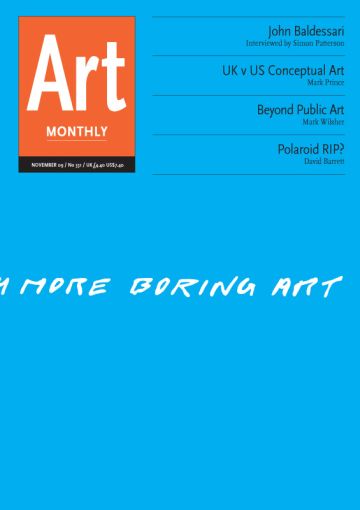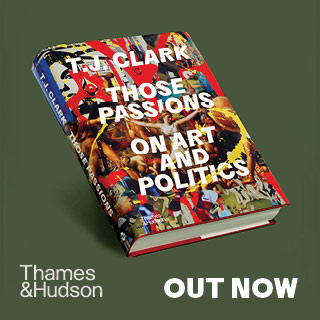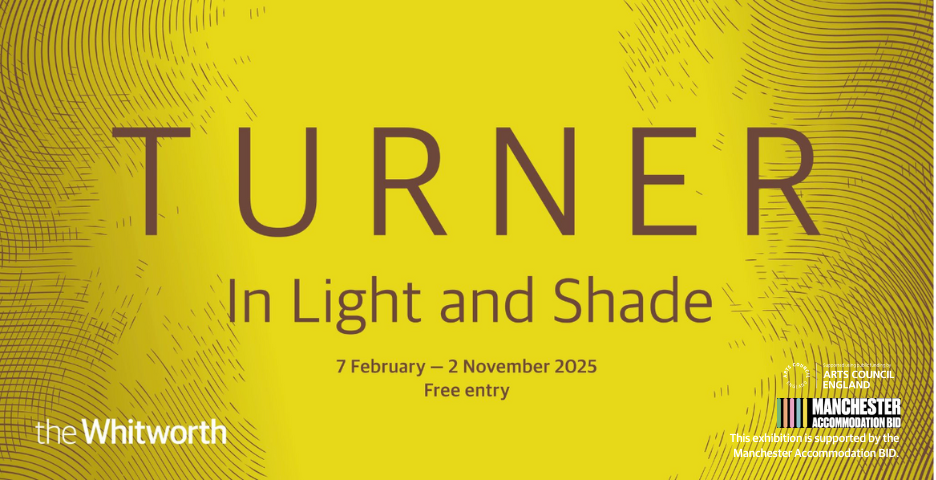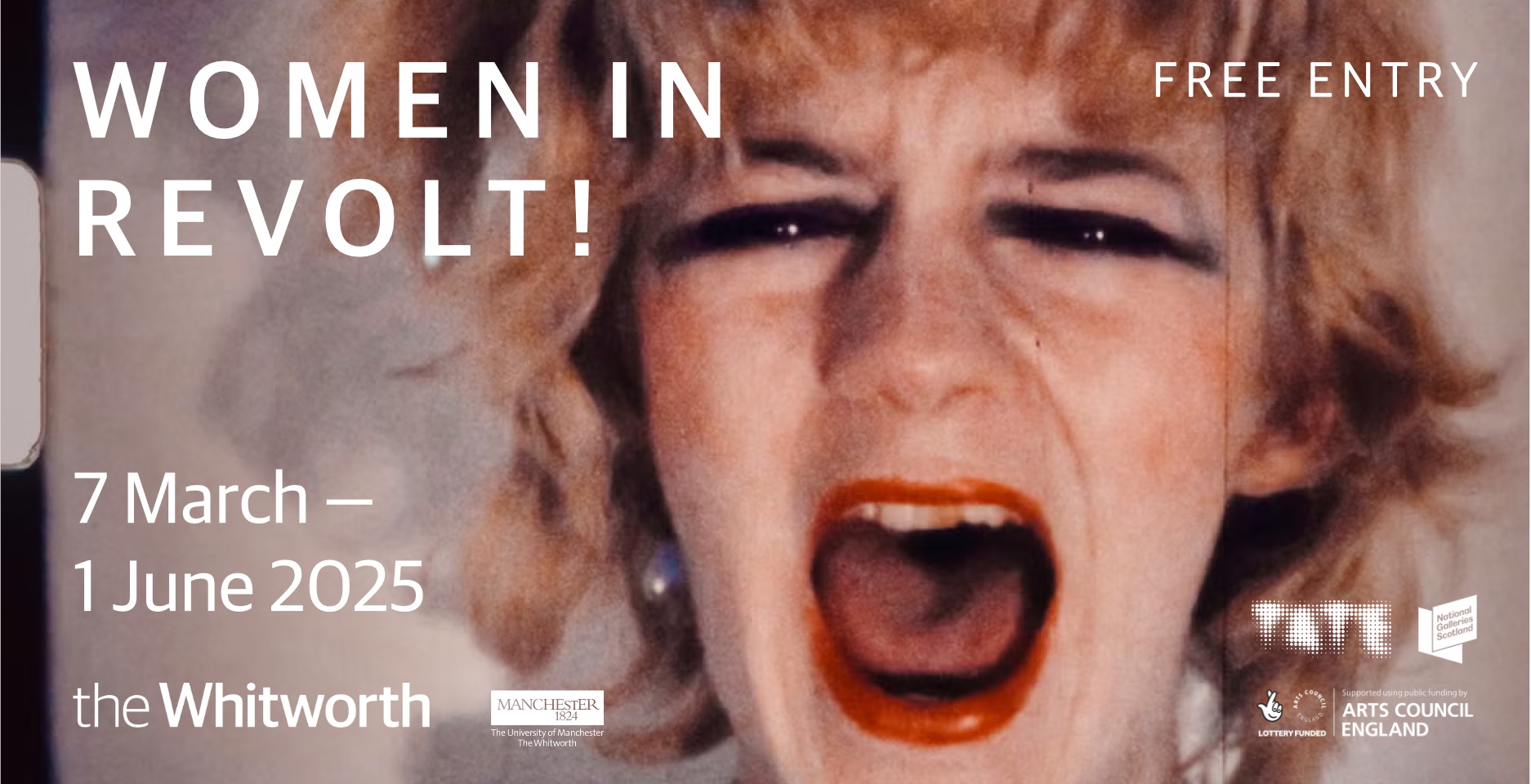Art Monthly 331
November 2009
John Baldessari
Interviewed by Simon Patterson
UK v US Conceptual Art
Mark Prince
Beyond Public Art
Mark Wilsher
Polaroid RIP?
David Barrett
Buy Now – select:
Want to read this right now?
Get instant access to the entire back catalogue via Exact Editions from only £8.99!
Contents
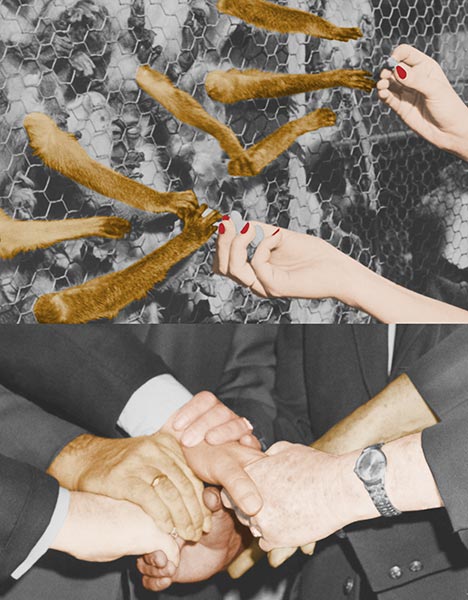
John Baldessari Hands and/or Feet (Part One): Monkey Arms / Hands 2009
Interview
Seeing the World Askance
John Baldessari interviewed by Simon Patterson
John Baldessari was one of the founders of Conceptual Art in the 1960s and has gone on to become a giant of the West Coast art scene in the US, both as an artist and highly influential teacher at CalArts. At this year's Venice Biennale he was awarded the Golden Lion Lifetime Achievement Award and currently has a major retrospective at Tate Modern. Here he talks with artist Simon Patterson about utilising stereotypes, his decision to abandon painting for text and photography, humour, using images like words, and the importance of art that looks like art.
'I decided to be reductive and shrink everything in some way, metaphorically. My first idea was that I was going to change the photographs into microdots and put them under stamps and mail them out to my artist friends, sort of like James Bond, but that was kind of labour intensive. But I liked the idea of somehow atomising things. And then I thought, I'll just burn them all.'

Susan Hiller Dedicated to the Unknown Artists 1972-76
Feature
The Lost Conceptualism
Mark Prince on UK v US Conceptual Art
Conceptual Art in the UK and the US had distinctively different approaches: one looked inward, the other outward. What happened to those self-reflexive tactics and how do young artists recycle such practices today?
'A crucial form for early British Conceptual Art is the self-reflexive loop: art which examines its own workings and only secondarily reveals the world.'
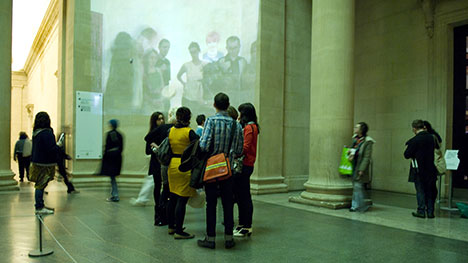
Late at Tate visitors
Feature
Beyond Public Art
Mark Wilsher proposes redefining public art
In September's feature, Dave Beech argued that public art should be understood through a redefinition of 'public space' in terms of activity rather than access. But couldn't we also define public art in terms of mainstream media rather than physical space, and shouldn't the idea of audience 'dialogue' be reframed as 'negotiation'?
'I would like to expand the notion of public art until it spills over into gallery or studio-based practice, and there is a wider idea of a kind of art that takes publicness as its subject without necessarily needing to expose itself to the weather.'
Comment
Editorial
The Mayor, the Minister, the Deputy and His Lover
Boris Johnson wants to give a major arts job to one of his cronies as a reward for supporting his mayoral election campaign. While he has never been one to avoid a stereotype, couldn't Johnson's hearty embrace of the 'corruption at City Hall' cliché yet come back to bite him in his long-standing rivalry with David Cameron?
'The main complaint against her appointment is that, in the words of one of the three selection panel members, Ms Wadley was "manifestly the least qualified of the four candidates". Despite this, Johnson went ahead and appointed her anyway.'
Artnotes
Boris Johnson gets his traditionalist way over the Fourth Plinth in Trafalgar Square; Tate curators faced being added to the sex offenders register over the 'Pop Life' exhibition; London art fairs suffer differing fates; gallery openings and closings; online resources; and all the latest news on art world appointments, events, commissions and more.
Submissions: Send Artnotes info to artnotes@artmonthly.co.uk
Obituary
David Troostwyk 1929-2009
Reviews
Exhibitions
Shake It: An Instant History of the Polaroid
Pump House Gallery, London
David Barrett
Thomas Demand
Neue Nationalgalerie, Berlin
Alex Coles
Anne Hardy
Maureen Paley, London
Laura McLean-Ferris
Sonia Boyce
Spike Island, Bristol
Colin Glen
Helena Almeida
Kettle's Yard, Cambridge
Cherry Smyth
Shaun Gladwell: Seven Year Linework
Spacex, Exeter
David Trigg
Re-Imagining October
Calvert22, London
Coline Milliard
AND - Abandon Normal Devices: Festival of New Cinema and Technology
various venues, Liverpool
Maxa Zoller
Lyon Biennale: The Spectacle of the Everyday
various venues, France
Pryle Behrman
ANTI Festival 2009
various venues, Kuopio, Finland
Frederika Whitehead
2nd Thessaloniki Biennale
various venues, Thessaloniki
Anna Dezeuze
Reviews
Books
Why Photography Matters as Art as Never Before
Morgan Falconer on Michael Fried's conversion to photography
'Big stuff is always "at stake" for people who work in the humanities departments of universities - it must be the do-or-die lives they lead. Ordinary folk are inclined to miss the urgency of it all, so you shouldn't be too surprised if you find yourself knee-deep in Michael Fried's new book and still not too sure why photography matters as art as never before.'
Modern Art Culture
Rachel Garfield on Francis Frascina's new reader
'Frascina has brought into dialogue texts that exemplify how claim and counter claim are bound to his notion of the modern.'
Reviews
Film
Dress Codes: 3rd ICP Triennial of Photography and Video
Kathy Battista on the influential New York triennial
'"Dress Codes" coincides with ICP's Year of Fashion, which explores fashion photography in an expanded context. The curators chose artists whose work includes props, costumes or disguise to construct cultural identity. The result is a show that is international in scope and tackles abiding issues including race, class, gender and sexuality.'
Report
Conference
Bergen Biennial Conference: To Biennial or not to Biennial
Teresa Gleadowe follows the debate about the form of a future biennale
'What can a biennale bring to a city? What agendas does it serve and what role does it play in the cultural, social, political and economic life of its locale? These were among the questions addressed in a three-day conference convened to discuss the proposition that Bergen should join the throng of 40 cities around the world currently hosting biennial exhibitions.'
Artlaw
Moral Rights
Chapman Kelley v Chicago Park District
Henry Lydiate on a legal wrangle over the destruction of a public artwork
'At the heart of the case lies the question of whether Kelley's work was an artwork entitled to protection under US moral rights legislation or whether it was merely landscaped public parkland - and therefore not entitled to such protection.'
Listings
Exhibitions
November exhibition listings
Art Monthly's exhibition listings can also be viewed online.
Submissions: Send Listings info to listings@artmonthly.co.uk

